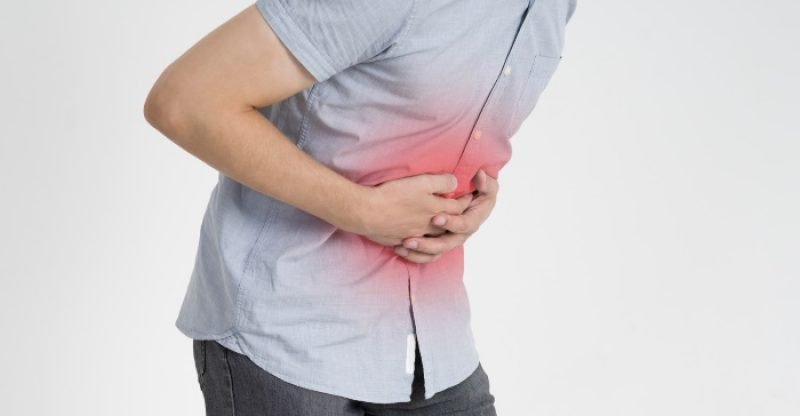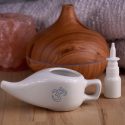Stomach Ulcer Symptoms, Treatments and Natural Remedies
If you or someone you care about is one of the five million people affected by stomach ulcers, you know that the discomfort and symptoms of this disorder can wreak havoc on your life.
Ten percent of all Americans will experience stomach ulcers at some point in their lives, so our guide to natural and effective treatments for stomach ulcers will likely help you now or in the future (1, 2).
While there are ways to avoid stomach ulcers, treating them naturally is possible, without the side effects of medications.
The diagnosis of stomach or peptic ulcers has changed over the years.
While it used to be believed stomach ulcers were caused only by stress, which produced excess stomach acid, we now understand there are many other factors that lead to the formation of stomach ulcers.
The causes of stomach ulcers vary but are related to bacterial infection, as well as factors like medication use and lifestyle.
These can influence your likelihood of developing peptic ulcers or their severity.
Understanding Stomach Ulcers
Ulcers are essentially damage to and small openings in the tissue that lines your digestive tract.
This lining keeps food particles and nutrients in your digestive system until they are ready to be released into your bloodstream.
Peptic ulcers allow particles to leak out, causing pain and other complications that can be life-threatening.
You can develop an ulcer in different parts of your digestive system, including your stomach, esophagus, and duodenum.
Women are most likely to develop ulcers in the stomach, while men more frequently develop duodenal ulcers, located in the small intestines.
Ulcers in different places can cause different symptoms.
It is more common for women to develop ulcers than men, especially if you take over-the-counter medications and other drugs regularly, and are over 70.
Most people who have ulcers are between 55 and 65 years of age.
Aging brings weakened immunity and increased inflammation, which raises the risk of digestive tract damage from bacteria and other factors that contribute to ulcers (3).
Commonly referred to as peptic ulcers, stomach ulcers are just one of the types of ulcers that develop in the digestive system.
Esophageal ulcers develop in the esophagus, just above the stomach.
The esophagus links your mouth to your stomach.
Duodenal ulcers develop in the small intestine.
The duodenum is the small part of your intestines where the pancreatic and bile duct both empty into your digestive tract.
This area is susceptible to ulcers because inflammation and other issues in your digestive tract can cause obstruction or dilation.
If left untreated, ulcers can start bleeding, forming bleeding ulcers.
These are very dangerous to your health.
If you have a broken blood vessel in your digestive tract, this can contribute to a bleeding ulcer, as well.
Some people experience an increase in the acid content of their gastric juices, which can have an impact on the stomach lining.
You may have also heard of gastric ulcers, which is just another name for the damage and openings that cause ulcers to form.
Proper diagnosis of a peptic ulcer may require an endoscopy.
This procedure uses a scope to view the digestive tract and its protective lining.
Verification of an ulcer can be necessary for proper treatment.
How Ulcers Work
Your digestive system uses hydrochloric acid and an enzyme called pepsin to digest the foods you eat.
If you have an ulcer, these compounds build up and cause damage to the lining of your digestive system.
You normally have a thick layer of mucus to protect your stomach lining from the acids inside.
This lining maintains itself by generating new cells, keeping blood moving through your stomach, and repairing the lining when necessary.
When this process becomes disrupted, your stomach lining becomes exposed to the harmful acids and forms sores, known as ulcers.
The burning sensation sometimes experienced with a stomach ulcer happens after you eat because the digestive process empties your stomach of acid.
When you eat, your stomach digests food and sends it down the line to your other digestive organs. It also sends the acid it used to digest your food.
For a brief time, then, your stomach is empty of acid.
When it starts to refill, the new acid comes into contact with your stomach ulcer, opening it back up and exposing the wound to the corrosive acid.
This causes pain and other symptoms.
In addition to pain, many people also experience other, more serious complications from ulcers.
If the ulcer grows and deteriorates the lining too much, you could perforate that part of your lining.
This cause internal bleeding, infection, and other problems.
This is a rare complication, though, and nearly all ulcers, or nine out of ten, can be healed without prolonged medication use or surgery.
Common Causes of Stomach Ulcers
There are several factors that contribute to the development of stomach or peptic ulcers.
The two most common are long-term use of certain medications and infection.
There are other causes of peptic ulcers, though rarer, including the cancerous and noncancerous tumors in the digestive system known as Zollinger-Ellison Syndrome (4).
The two main causes of peptic ulcers are worth a closer investigation, though.
NSAID Use and Ulcers
The long-term use of certain medications, including the non-steroidal anti-inflammatory drugs known as NSAIDs, has been linked to the formation of peptic ulcers.
NSAIDs include over-the-counter medicines such as naproxen, ibuprofen, and aspirin.
Not everyone who takes NSAIDs will develop a stomach ulcer, but those who take this type of medication every day or multiple times per week are more likely to develop one.
Your risk of developing an ulcer from NSAID use increases if you are 70 or older, are a woman, take two or more types of NSAIDs, take NSAIDs regularly or for a prolonged period, had an ulcer in the past, have more than one medical condition, drink alcohol, smoke, or take medications to increase bone mass or corticosteroids (5).
If you have any of these risk factors, you may want to monitor your use of NSAIDs closely.
H. pylori and Ulcers
Helicobacter pylori, or H. pylori, is a bacteria that is common in those with peptic ulcers.
Not everyone who has the H. pylori bacteria in their bodies will develop ulcers, though.
In fact, while 30-40 percent of Americans become infected with the bacteria, in most cases, the infection causes few or no symptoms.
In some, though, the spiral-shaped bacteria can cause damage to the lining of the digestive tract, including the stomach and duodenum.
As many as six in ten older adults with stomach ulcers have H. pylori bacteria in their systems.
Other Contributing Factors to Peptic Ulcers
Other factors that can increase your risk of developing a stomach ulcer include:
- Lowered immunity caused by poor eating habits, high stress, and high levels of inflammation;
- Smoking;
- Drinking excessive amounts of alcohol;
- Advanced age;
- A family history of ulcers.
While the genetic link for stomach ulcers is unclear, there is evidence to suggest that, in some families, there is a higher risk of developing them.
Over half of those who have duodenal ulcers report having a relative with one, as well (7).
Common Symptoms of Stomach Ulcers
Ulcers are painful sores, and stomach ulcers develop in the lining of the stomach.
The symptoms of a stomach ulcer range from mild to severe, and can change in severity and last for different lengths of time.
Most who have a stomach ulcer notice symptoms and pain.
If you experience any of these other symptoms, you may have a stomach ulcer.
- Pain in your abdomen;
- Burning or bloating in your abdomen, especially after eating;
- Nausea or vomiting;
- Blood in vomit or feces;
- Dark stools;
- Trouble sleeping because of pain;
- Decreased appetite, weight loss;
- Heartburn, reflux, excess gas;
- Diarrhea.
If you have a stomach ulcer, you are at an increased risk for perforation of an organ lining.
You are also more likely to become dehydrated or have weakness due to changes in your food and liquid intake.
There are many changes you can make to your diet and lifestyle that will improve your symptoms and help heal your peptic ulcer.
Knowing what to avoid is also helpful in not aggravating ulcer symptoms.
Treating Stomach Ulcers Naturally
If you think you might have a stomach ulcer, it is a good idea to see your physician to eliminate any other cause for your pain or symptoms.
Diagnosing a stomach ulcer will likely involve a medical history and exam, questions regarding your past use of certain medications, a blood test, and possibly x-rays or other diagnostic imaging.
Treatment of a peptic ulcer is designed to reduce the inflammation and pain you are experiencing in your digestive tract.
Boosting your immune system so that it can fight infection from H. pylori is also an important goal.
Ultimately, you want to lower your chance of future problems by preventing new ulcers from forming.
The following are our top natural strategies for reducing stomach ulcer symptoms, healing your ulcer, and preventing new ulcers from forming.
Limit NSAID Use
When you take NSAIDs, they alter how your body produces stomach acids and digestive enzymes.
While NSAIDs are designed to target the enzymes that promote inflammation and pain, they also affect the production of chemicals in your stomach lining that protects it from acid.
Because the chronic or prolonged use of NSAID pain relievers is linked to an increased incidence of stomach ulcers, cutting back on these medications is an important first step in ulcer treatment and prevention.
These medications are used to treat pain, fever, inflammation, and swelling.
Taking them occasionally to treat these problems is fine, but taking them every day or for chronic conditions is not healthy for your digestive system.
If you have recurring or chronic arthritis pain, headaches, muscle tears, infections, or other medical problems, talk to your doctor about other, healthier ways to treat your symptoms.
Or look for natural remedies that do not cause the negative side effects of NSAIDs.
Reducing or eliminating your use of NSAIDs can help your body repair your stomach or digestive tract lining, allowing your stomach ulcer to heal.
Discontinuing chronic or prolonged use will help your stomach stay healthy in the future, as well.
Control Inflammation and Boost Your Immunity
H. pylori bacteria damages the mucus protecting your digestive tract lining from acids.
When that coating is damaged, acids create holes and irritation in the lining, causing pain and peptic ulcers over time.
H. pylori bacteria are spread in a number of ways, including unclean water, sharing utensils or food, and bodily fluids (8).
Having H. pylori, though, does not automatically mean you will get an ulcer.
When your immune system is hampered for other reasons, you can become susceptible to H. pylori’s effects, and develop a stomach ulcer.
If you have high levels of inflammation already in your body due to diet, lifestyle, or a medical condition, your digestive system can become victim to H. pylori, as well.
This bacteria then promotes more inflammation in your digestive tract, creating a cycle of inflammation that is hard to break.
To boost your immune system’s ability to protect against H. pylori, you can limit immune-suppressing activities like smoking, drinking alcohol, eating a nutrient-poor diet, and living a sedentary life.
All of these promote inflammation and lower immunity.
Many of the dietary recommendations below can help reduce the inflammation in your body caused by other medical issues and stress.
In addition, if you have inflammatory medical problems, such as chronic fatigue syndrome, rheumatoid arthritis, lupus, or gout, talk with your doctor about ways to control this inflammation, or seek natural remedies to help lower its overall levels.
Get Your Stress under Control
While we now know that stress alone does not cause ulcers to form, having too much stress in your life can still contribute to your risk of developing a peptic ulcer.
Stress is a trigger for inflammation and lowers immunity, making you more vulnerable to H. pylori and other factors that cause ulcers.
Stress can also trigger physiological changes in your digestion through normal stress response mechanisms.
When you are stressed, you release cortisol and adrenaline, which are also connected to your instinctual fight or flight response.
When you feel this, your body changes many metabolic processes, including digestion.
If you live with chronic stress, have PTSD, or have a mental illness like depression or anxiety, there is a high likelihood that you have some sort of digestive problem, including ulcers (9).
Because stress weakens the immune system, this is thought to contribute to the above-average rates of H. pylori infections and peptic ulcers in those with anxiety and chronic stress.
Managing stress can boost your immune system and allow you to fight off the bacteria that is causing your stomach ulcer.
Some effective methods for reducing stress include practicing yoga, meditating, getting plenty of exercises, engaging in a hobby or pastime, learning a new skill, or spending time outdoors.
You may also consider prayer, making sure you are getting quality sleep and using essential oils to help you relax.
How you reduce stress is dependent on what you find relaxing, but the important thing to remember is that you work toward decreasing your stress in ways that work for you.
Eating to Treat Your Stomach Ulcer Naturally
Some general guidelines about what you eat or drink can help you feel better and relieve your ulcer symptoms.
Helpful tips for those with stomach and other types of ulcers include:
- Maintain a healthy weight. If you are obese, lose weight.
- Quit smoking.
- Drink in moderation.
- Get tested to determine if you have dietary sensitivities, such as to dairy or gluten.
- Do not eat within three hours of going to bed or lying down for extended periods.
- Eat small meals regularly throughout the day.
- Do not eat or drink very hot foods or liquids.
- Be sure to stay hydrated if your ulcer causes vomiting or nausea. Watch also for nutrient deficiencies and electrolyte imbalances if you have these or diarrhea.
- If you find you are eating less to avoid stomach ulcer pain, be sure to watch your caloric and nutrient intake. Foods low in nutrients, antioxidants, and minerals also contribute to inflammation.
Changing the way you eat can help your body heal a peptic ulcer naturally, and prevent future recurrence.
In addition to avoiding some key foods that contribute to acid production and promote gastric discomfort, you can add healthy and beneficial foods to your diet to promote healing, calm inflammation, and heal your stomach ulcer naturally.
Foods to Avoid
The foods most likely to contribute to ulcer symptoms include:
- Spicy peppers;
- Black pepper;
- Chili powder;
- Coffee or tea, whether with or without caffeine;
- Caffeine in any form;
- Citrus fruits and juices;
- Alcohol;
- Fried and fatty foods;
- Cola beverages;
- Cocoa and chocolate;
- Peppermint;
- Tomato products.
Focus on a Balanced, Healthy, Whole-Foods Diet
If your diet is high in processed or packaged foods, and you are eating few whole or fresh foods, you are likely contributing to your ulcer symptoms.
These types of foods promote inflammation and lower immunity.
Focus instead on whole foods, including fresh fruits and vegetables, legumes, lean proteins, and foods naturally low in sugar and fat.
These will provide you with the necessary nutrients, high amounts of fiber, important amino acids, and fatty acids, and other healthy components that can heal your stomach ulcer (10).
Eating smaller, regular meals is preferable to large, infrequent meals when treating a stomach ulcer.
Eating small amounts produces less acid, and filling your stomach only partially can help prevent flares and excess acid.
Eat Plenty of Probiotics
Your digestive tract normally includes healthy, living bacteria and yeast that assist with digestion and systemic regulation.
These probiotics should be nurtured, and eating probiotic-rich foods can help increase the presence of these healthy organisms.
Fermented foods are particularly rich in probiotics, so eat plenty of yogurt with active cultures, kimchi, kefir, sauerkraut, buttermilk, miso, and kombucha.
If you don’t eat these foods, you can also take a probiotic supplement.
Probiotics can help combat H. pylori in your digestive system, promoting healing of your peptic ulcer naturally.
Antibiotics often will wipe out your natural probiotic supply, so if you take a round of this type of medication, be sure to restore your levels with probiotic-rich foods or a supplement.
Focus on Flavonoids
Flavonoids are a class of plants that have protective qualities for your digestive system.
The compounds in flavonoids not only help fight H. pylori but also protect the lining of your gastrointestinal tract (11).
Flavonoids are found in many vegetables and fruits, including:
Learn to Love Licorice
Another powerful flavonoid, licorice, which is derived from the root of the Glycyrrhiza glabra plant, has been used as a traditional medicine for centuries.
This herbal medicine is effective in treating peptic ulcers, and can even help prevent future ulcers from forming.
Licorice stimulates mucus production in the intestines and stomach, which can protect the gastrointestinal lining.
This mucus can also enhance the healing process, and alleviate pain caused by stomach ulcers (12).
Licorice may also assist in preventing H. pylori from reproducing in your digestive system.
The most effective use of licorice for this purpose has been studied using licorice extract (13).
When considering this natural remedy, remember research is examining the effects of licorice root, not candy flavored with licorice.
Eat More Bananas
The banana is a tasty and powerful way to protect your stomach from ulcers and heal them once they form.
They contain high amounts of flavonoids, which strengthen the gastrointestinal lining and prevent ulcers from appearing.
They also promote healing in your stomach lining by triggering the cells to reproduce.
Plantains, which are related to bananas, are even better at treating and preventing stomach ulcers (14).
Eating a banana every day is a healthy, nutritious addition to your diet that can have a lasting impact on your stomach ulcers.
Try Cabbage
Cabbage has natural properties that make it an excellent choice for treating and preventing stomach ulcers.
It is high in lactic acid, which stimulates amino acid production.
These amino acids promote healing by encouraging blood flow to the stomach lining.
This repairs the lining and protects it from future problems, as well.
Use Plenty of Garlic
Extract of the garlic plant has been shown to slow or stop the growth of H. pylori bacteria.
This is excellent news for many with the infection who also have stomach ulcers (15).
If you don’t enjoy the taste of garlic, try garlic extract as a supplement.
Garlic is a natural blood thinner, so talk with your doctor before taking supplements if you are currently taking a blood thinner or are on an aspirin regimen.
The History of the Diagnosis of Stomach Ulcers
Doctors first started treating ulcers in the 1880s with surgery.
This antiquated procedure required the removal of portions of the stomach, which was then sewn to the intestines.
This surgery was only partially successful in resolving peptic ulcers for most patients, and a good many also died from excessive bleeding and surgical complications.
For most of the 1900s, stomach ulcers were believed to be caused by stress.
Because many people who suffered from ulcers were also people with high-stress jobs, this correlation was thought to be causation.
These sufferers also likely smoked heavily and suffered from lack of sleep.
Animal trials seemed to cement the notion of stress-induced ulcers when rats were placed into high-stress scenarios and then developed high levels of damage in their digestive tracts due to acid erosion.
This led to the long-time stomach ulcer treatment of antacids, as it was thought that reducing the presence of acid would cure the ulcers themselves.
While H. pylori was discovered much earlier, it was not until 1982 that it was identified as the leading cause of peptic ulcers, rather than stress or diet.
Early treatments included antibiotics to kill the infection, but this did not always resolve the ulcers or fully kill the bacteria.
Long-term treatment with antibiotics can lead to other, more serious problems, including antibiotic resistance (16).
Because having H. pylori does not automatically mean you will develop a stomach ulcer, doctors then theorized there were additional factors that make it more likely that you will develop one if you have this bacteria in your system.
These lifestyle factors include those previously mentioned related to stress, diet, exercise, and inflammation.
Precautions
For those suffering from stomach ulcers, a natural instinct is to reduce the acid in your stomach with acid-reducing medications.
While this can help temporarily to relieve minor symptoms, they will not heal your peptic ulcer or alleviate the underlying cause of your ulcer.
Healing your stomach ulcer and focusing on long-term habits that will keep it from returning should instead be the focus of your treatment plan.
While half a million people each year are diagnosed with peptic or stomach ulcers in the US, there are many natural treatments that are effective at alleviating ulcer symptoms and helping to heal the damage done by peptic ulcers.
If you are experiencing any of the symptoms of an ulcer, especially abdominal pain, burning in your stomach, nausea, vomiting, or other gastrointestinal distress symptoms, talk to your doctor to get a proper diagnosis.
These can also be signs of other, serious medical problems that should not be ignored.
Remember that most stomach ulcers can be healed without serious medical intervention.
Using these and other natural remedies can help you treat your ulcer symptoms at home and prevent future problems.
Your biggest defense against a stomach ulcer is a healthy diet and lifestyle that reduces inflammation and infection.
Limiting your use of NSAIDs and treating an infection from H. pylori bacteria will be your most helpful remedies for dealing with a stomach ulcer.
In addition, reducing your stress, controlling inflammation, promoting your immune system, and changing your diet can also be quite effective at treating your stomach ulcer naturally.
FDA Compliance
The information on this website has not been evaluated by the Food & Drug Administration or any other medical body. We do not aim to diagnose, treat, cure or prevent any illness or disease. Information is shared for educational purposes only. You must consult your doctor before acting on any content on this website, especially if you are pregnant, nursing, taking medication, or have a medical condition.
HOW WOULD YOU RATE THIS ARTICLE?







Can I get back to less strict diet when my ulcer is treated? Or it is a lifetime condition?